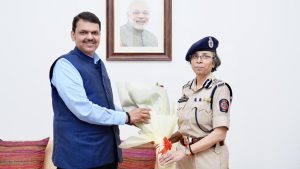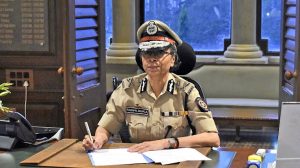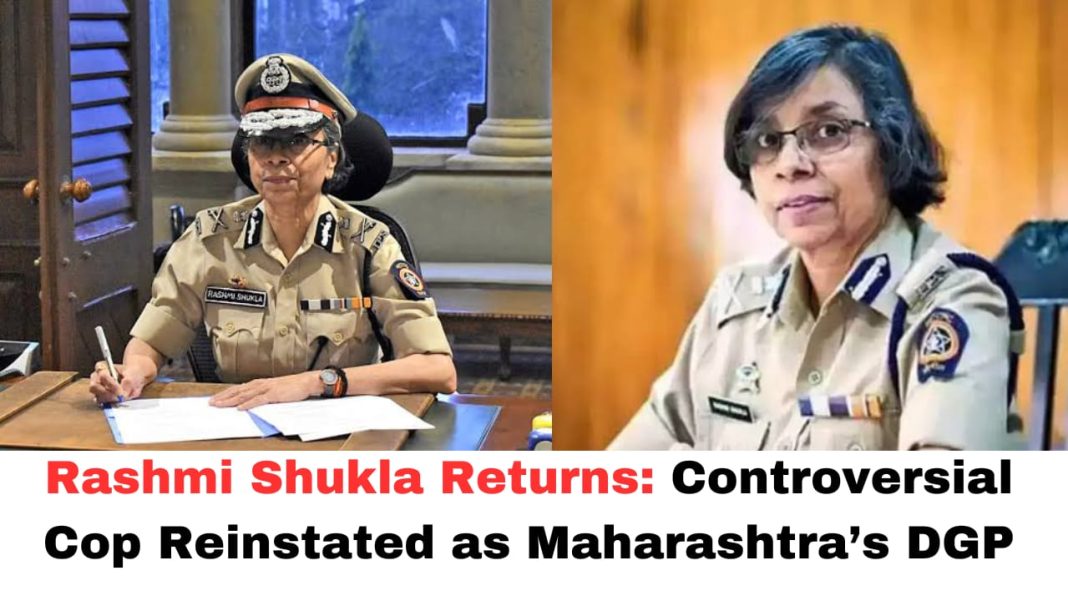Digital News Guru Maharashtra Desk:
Rashmi Shukla’s Reinstatement as Maharashtra’s DGP: A Controversial Comeback
Rashmi Shukla, a seasoned 1988-batch IPS officer with a distinguished yet controversial career, has been reinstated as the Director General of Police (DGP) of Maharashtra. This decision, announced shortly after the conclusion of the assembly elections, has reignited debates surrounding her tenure and the role of political influence in administrative appointments. The move comes amid accusations of partisanship and a legacy marred by allegations of unauthorized phone tapping, a contentious episode that continues to overshadow her career.
Background: A Career in Law Enforcement
Rashmi Shukla has had a prolific career in law enforcement, earning accolades for her work in critical roles across Maharashtra. However, her tenure as the chief of the state intelligence department during the Maha Vikas Aghadi (MVA) government became a flashpoint of controversy. She was accused of authorizing the illegal surveillance of political figures and opposition leaders. FIRs were lodged against her in Pune and Mumbai in 2022, alleging the misuse of her authority to tap phone conversations without proper clearance.

These charges, though serious, were later dismissed following the BJP-led coalition’s return to power, raising questions about the impartiality of investigations and the role of political expediency in the administration of justice.
The Political Context: Why Was Shukla Removed?
Shukla’s removal from the DGP position in early November 2024 stemmed from complaints by the Congress party, a member of the opposition coalition in Maharashtra. Congress leaders accused her of bias toward the BJP, claiming her continued presence in the top policing role could influence the electoral process. This led the Election Commission of India (ECI) to intervene, placing Shukla on compulsory leave and appointing Sanjay Kumar Verma as an interim DGP.
The Congress party alleged that Shukla had violated the Model Code of Conduct during her interactions with BJP leaders, including Deputy Chief Minister Devendra Fadnavis. These allegations, however, did not lead to any formal action against her during the election period.
Reinstatement After BJP Victory
Following the BJP-led Mahayuti coalition’s decisive win in the state elections, Rashmi Shukla was reinstated as DGP by Maharashtra’s Home Department. Chief Minister Eknath Shinde approved the decision, citing the need for continuity and leadership experience in Maharashtra’s police force. Shukla’s reinstatement, effective November 26, 2024, marked the end of her period of forced leave imposed by the Election Commission.
Opposition’s Response
The reinstatement has been met with sharp criticism from opposition parties, particularly the Congress. Spokesperson Atul Londhe criticized the move, arguing that it undermines the integrity of the state’s police force. Londhe reiterated concerns about Shukla’s alleged bias and her controversial tenure, stating that her appointment raises serious questions about political interference in law enforcement.
Moreover, critics highlight her past involvement in phone-tapping allegations, which they argue compromise her credibility. The Congress has called for stricter oversight mechanisms to ensure the impartiality of high-ranking officers, especially during politically sensitive periods.
Support for Shukla: Stability in Leadership
Supporters of Rashmi Shukla’s reinstatement, including members of the ruling BJP-led coalition, argue that her return ensures stability in Maharashtra’s law enforcement apparatus. They emphasize her extensive experience and leadership capabilities, which are seen as assets in managing the state’s complex law-and-order challenges.
The BJP has also dismissed the allegations against her as politically motivated, asserting that her reinstatement reflects confidence in her professionalism and ability to lead the police force effectively.
Broader Implications
Shukla’s reinstatement underscores the interplay between politics and administrative decisions in India. High-profile appointments in law enforcement often become battlegrounds for political rivalry, with allegations of bias and misuse of power frequently surfacing.

The decision to reinstate Shukla also highlights the challenges of ensuring impartiality in law enforcement, particularly in a politically charged environment like Maharashtra. Critics argue that such appointments risk undermining public confidence in the police force, while supporters believe experienced officers like Shukla are crucial for maintaining law and order.
Conclusion
Rashmi Shukla’s return as Maharashtra’s DGP is emblematic of the enduring tension between governance and politics. While her supporters view her reinstatement as a logical step to restore stability in the state’s policing, her critics see it as a politically motivated move that could undermine public trust in law enforcement.
As Shukla resumes her duties, the spotlight will remain on her actions and decisions, particularly in light of her contentious past. Whether she can navigate the challenges of her role while addressing the concerns raised by her critics will determine her legacy as one of Maharashtra’s most prominent law enforcement officers.
You May Also Read: Konark: The Majestic Sun Temple and Its Timeless Significance









